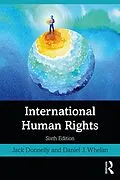Fully updated, the sixth edition of International Human Rights examines the ways in which states and other international actors have addressed human rights since the end of World War II.
This unique textbook features substantial attention to theory, history, international and regional institutions, and the role of transnational actors in the protection and promotion of human rights. Its purpose is to explore the difficult and contentious politics of human rights, and how those political dimensions have been addressed at the national, regional, and especially international levels.
Key features include:
- substantially revised throughout, including new material on LGBTQ rights in Africa, Indigenous peoples' rights in Guatemala, the Rohingya crisis in Myanmar, and a new chapter on human rights and development;
- in-text features such as discussion questions, suggested readings, case studies, and "problems" to promote classroom discussion and in-depth examination of topics;
- concise yet clearly organised and comprehensive coverage of the topic.
International Human Rights is essential reading for courses and modules in human rights, politics and international relations, law, criminal justice, sociology, social work, public administration, and international development.
Autorentext
Jack Donnelly is the Andrew W. Mellon Professor of International Relations at the Josef Korbel School of International Studies at the University of Denver, USA.
Daniel J. Whelan is Bill and Connie Bowen Odyssey Professor of Politics at Hendrix College, USA.
Klappentext
Fully updated, the sixth edition of International Human Rights examines the ways in which states and other international actors have addressed human rights since the end of World War II.
This unique textbook features substantial attention to theory, history, international and regional institutions, and the role of transnational actors in the protection and promotion of human rights. Its purpose is to explore the difficult and contentious politics of human rights, and how those political dimensions have been addressed at the national, regional, and especially international levels.
Key features include:
- substantially revised throughout, including new material on LGBTQ rights in Africa, Indigenous peoples' rights in Guatemala, the Rohingya crisis in Myanmar, and a new chapter on human rights and development;
- in-text features such as discussion questions, suggested readings, case studies, and "problems" to promote classroom discussion and in-depth examination of topics;
- concise yet clearly organised and comprehensive coverage of the topic.
International Human Rights is essential reading for courses and modules in human rights, politics and international relations, law, criminal justice, sociology, social work, public administration, and international development.
Inhalt
Part I: History and Theory
1. Human Rights in Global Politics: Historical Perspective
2. Theories of Human Rights
3. The Relative Universality of Human Rights
4. The Unity of Human Rights
Part II: Multilateral, Bilateral, and Transnational Action
5. Global Multilateral Mechanisms
6. Regional Human Rights Regimes
7. Human Rights and Foreign Policy
8. Human Rights in American Foreign Policy
9. Transnational Human Rights Advocacy
Part III: Contemporary Issues
10. Humanitarian Intervention
11. Globalization, the State, and Human Rights
12. Human Rights and Development
13. (Counter-)Terrorism and Human Rights
14. What Has Been Achieved? And How Much is Left to be Done?
